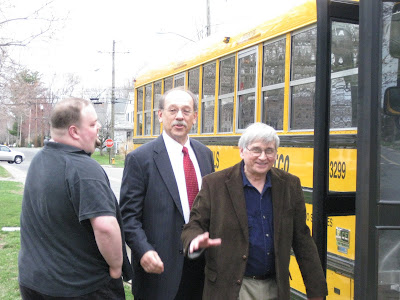

At a cost of $191,000, the new bus is expected to save up to 30% on fuel costs, depending on conditions under which the bus is operated. For the first 20 mph, the bus runs on its batteries, then the diesel assists between 20 mph and highway speed, and at highway speed, the bus runs on diesel.
DATTCO President Don DeVivo and seven other DATTCO employees were present to introduce the bus to the BOE, and DeVivo explained how the bus came to Middletown: "Middletown received a grant for $106,000 from the Connecticut Clean Cities Project, and the town paid the other $80,000. DATTCO is buying back the bus over a 5 year period, and the amount of the lease is being subtracted each month from the payment Middletown already pays DATTCO. At the end of 5 years, DATTCO will own the bus, but it will continue to run in Middletown. The BOE will get the benefit in fuel savings for this particular bus."

Anyone attending the BOE meeting was invited for a bus ride around the block, and I was surprised at how quiet the bus was. It also had a GREAT new bus smell (I do love the new car smell), and several of us were tempted to sing as we drove around the block (but we refrained).
BOE Chairman Ted Raczka commented after the demonstration: "We talk about our carbon footprint and global warming and our dependence on foreign oil, but it's our little school district that's actually doing something about it....I hope to have a second bus by next fall."

Transportation Director Mike Milardo explained that Route 10 would have been the ideal route for this bus: it's designed specifically for a route with lots of starts and stops because that keeps the speed down under 20 mph when only the batteries are powering the bus. However, Route 10 requires a 83 passenger bus and the new hybrid is only a 71 passenger bus. That made Route 22 the second best choice, but since there is a lot of downtown driving for the Keigwin stops, driver Rebecca Gilbert was proud to be making a difference for the pollution level downtown.
BOE Student Rep Michael Durso summed it up this way: "It's one small step to becoming more green...we're definitely heading in the right direction."

5 comments:
Maybe now with lower speeds as an incentive to save money, buses will now observe the speed limits in town. Obviously the safety of the children hasn't been a concern.
What is the range on battery power? If much of the route is on battery power, will the batteries last?
How about when it's below freezing?
What about when the A/C is on? How about heat in the winter?
Does the diesel engine charge the batteries?
What will be the anticipated charging costs?
How long do the batteries last-and how much to replace them?
Inquiring minds want to know.
Dear GlassHalfFull - I can answer some of your questions but not all of them. The batteries are charged by the engine as the bus is running, so "range" really isn't an issue and neither is charging costs. As far your other questions go, I will see if DATTCO can answer those questions.
For Anonymous, if you see a school bus driving unsafely, for whatever reason, please note the number on the bus and the time and location you saw the incident. Then call the District office and ask to speak to Transportation Director Mike Milardo. The number is 860-638-1418.
WHY the heck did the BOE go out and buy this thing with the budget short fall??
Jam,
I have reported dozens of times over several years. Nothing has changed. He says all he can do is notify DATTCO of the complaint. Once on High Street the bus was going so fast I couldn't safely catch up to it to get its number. When the tragedy eventually happens and children are injured or killed, I will offer to testify in the ensuing lawsuits for negligence. There was a proposal for all buses to have GPS units on board. Does anyone know if that happened and if a FOI request for speed data is possible?
Post a Comment